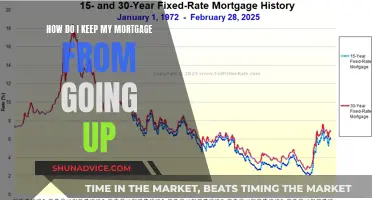
Freddie Mac is not a lender or a government agency, but it does have a large influence on the availability and price of home loans. It was chartered by Congress in 1970 to ensure that homebuyers and homeowners could access home loans reliably and affordably. Freddie Mac is one of the largest purchasers of mortgages in the United States, but it does not service its own loans. If you want to find out if Freddie Mac owns your loan, you can use the self-service loan look-up tool on its website.
| Characteristics | Values |
|---|---|
| How to know if Freddie Mac owns your mortgage | Use the Freddie Mac self-service loan look-up tool on their website |
| Freddie Mac's role in the mortgage market | Freddie Mac purchases mortgage loans from lenders to enable them to provide financing options to qualified borrowers |
| Freddie Mac's influence on the market | Freddie Mac helps ensure homebuyers have access to affordable mortgages by purchasing mortgage loans from lenders and bundling them into mortgage-backed securities to sell to investors |
| Freddie Mac's impact on interest rates | By providing a steady supply of mortgage funds, Freddie Mac helps keep interest rates low for borrowers |
| Freddie Mac's relationship with lenders | Freddie Mac does not lend directly to homebuyers but acts as a secondary market conduit, purchasing loans from lenders and selling them to investors |
| Freddie Mac's response to economic uncertainty | Along with Fannie Mae, Freddie Mac helps bring stability to the housing market during times of economic uncertainty by ensuring a steady supply of mortgage funds |
What You'll Learn

Freddie Mac's role in the secondary mortgage market
Freddie Mac is the colloquial term for the Federal Home Loan Mortgage Corporation (FHLMC). It is a government-sponsored enterprise (GSE) that was chartered by Congress in 1970 to ensure that homebuyers and homeowners could access home loans reliably and affordably.
Freddie Mac is not a lender or a government agency, but it has a large influence on the availability and price of home loans. It achieves this by purchasing mortgage loans that banks, credit unions, and other mortgage lenders and financial institutions make to borrowers. This increases the supply of capital to the primary mortgage market.
Freddie Mac then bundles these loans into mortgage-backed securities (MBS) and sells shares of them to investors in the secondary mortgage market. It guarantees the timely principal and interest mortgage payments to investors, thus attracting more investors to the secondary mortgage market. This also lowers the level of risk investors take on when purchasing the mortgage-backed securities.
Freddie Mac, along with its sister organization, Fannie Mae, helps bring stability to the housing market and financial markets during times of economic uncertainty by ensuring a steady supply of available mortgage funds.
Discovering Your Original Mortgage Amount: A Simple Guide
You may want to see also

How to use the Freddie Mac loan look-up tool
To use the Freddie Mac loan look-up tool, you first need to gather some personal information. This includes your first and last name, address, and the last four digits of your Social Security Number.
Then, visit the Freddie Mac website and find the loan look-up tool. You can also use this tool to find out if a property has a mortgage loan purchased or securitized by Freddie Mac. When entering the address, use the street address of the building, the leasing office, the clubhouse, or the community.
Carefully fill out the form with the information you gathered, being mindful of any typos or mistakes, as this could lead to an inaccurate result.
After you have submitted the form, the results will indicate whether Freddie Mac owns your loan or not. If Freddie Mac does own your loan, the resulting page will show a match. If they do not, no match will be returned.
If you are facing financial uncertainty and have a Freddie Mac-owned loan, you may qualify for mortgage relief solutions like a forbearance plan or loan modification. You might also be eligible for a refinance program, which can offer benefits such as reduced interest rates and lower monthly payments.
Understanding Balloon Mortgages: Do You Have One?
You may want to see also

Freddie Mac's influence on the availability and price of home loans
Freddie Mac, or the Federal Home Loan Mortgage Corporation (FMCC), is a government-sponsored enterprise that was chartered by Congress in 1970 to help make sure homebuyers and homeowners could access home loans reliably and affordably. It is neither a lender nor a government agency, but it has a large influence on the availability and price of home loans, which affects how affordable housing is.
Freddie Mac helps ensure that homebuyers and homeowners have access to affordable mortgages by purchasing mortgage loans from banks, credit unions, and other mortgage lenders and financial institutions. This increases the supply of capital in the primary mortgage market, which in turn helps to lower the cost of obtaining that capital. It also lowers the risk for banks and other mortgage lenders to make a loan, which results in lower interest rates for borrowers.
Freddie Mac also helps to bring stability to the housing market and financial markets during times of economic uncertainty by ensuring there is a steady supply of available mortgage funds. It does this by providing liquidity to the rental housing market, improving access to quality, affordable housing.
Freddie Mac sets its loan amount and pricing parameters for the loans it guarantees. Loans that fall within these parameters are seen as less risky and are therefore cheaper to obtain than larger loans. To determine if a property falls within Freddie Mac's loan limit, you can add the loan amount to your down payment and narrow your home search to properties that fall at or below that price range. An affordability calculator can help with this.
To find out if Freddie Mac owns your loan, you can use the secured loan look-up tool on its website.
Who Owns Your Mortgage Now? Find Out
You may want to see also

Freddie Mac's guarantee to investors
Freddie Mac is the colloquial term for the Federal Home Loan Mortgage Corporation (FHLMC), which was chartered by Congress in 1970 to help ensure homebuyers and homeowners could access home loans reliably and affordably. It is not a lender or a government agency, but a government-sponsored enterprise (GSE) that buys residential mortgages on the secondary market.
Freddie Mac purchases mortgage loans from banks, credit unions, and other mortgage lenders and financial institutions, increasing the supply of capital to the primary mortgage market. It then bundles these loans into mortgage-backed securities (MBS) and sells shares of them to investors in the capital markets.
Freddie Mac guarantees the on-time principal and interest mortgage payments to the investors, covering the cost to investors if the borrower defaults on their loan. This lowers the level of risk investors take on when purchasing the mortgage-backed securities, making them a relatively safe investment with a credit rating close to that of US Treasuries. This guarantee also attracts more investors to the secondary mortgage market and, in exchange for assuming the credit risk, Freddie Mac charges the investor a fee.
Freddie Mac's investors include central and commercial banks, pension funds, insurance companies, and securities dealers from around the world. Its multifamily business segment supports affordable rental opportunities across the nation, providing liquidity and stability to the rental housing market and improving access to quality, affordable housing.
Finding Non-Recourse Mortgages: What You Need to Know
You may want to see also

How to identify your mortgage servicer
If you're unsure who owns your mortgage, there are several ways to find out. Firstly, you can use the Freddie Mac loan look-up tool to see if Freddie Mac owns your loan. If they do, you should have received a letter informing you of this. Freddie Mac is one of the biggest buyers of home mortgages in the United States, but they do not service their own loans.
Your mortgage servicer should be your first port of call if you need assistance with your mortgage. You can find their contact information on your monthly mortgage statement or coupon book. You can also look up your mortgage servicer by searching the Mortgage Electronic Registration Systems (MERS) website. Alternatively, you can call your mortgage servicer or send a written request asking for information on who owns your loan. They are required to provide you with the name, address, and telephone number of the owner of your loan.
If Freddie Mac does not own your loan, it may be owned by its sister organization, Fannie Mae. You can use the Fannie Mae lookup tool to find out. Fannie Mae and Freddie Mac have similar functions: to ensure plentiful and affordable capital in the housing market. They do this by purchasing mortgage loans from lenders so that they can provide financing options to qualified borrowers.
Who Services My Mortgage? Find Out Now
You may want to see also
Frequently asked questions
You can use Freddie Mac's self-service loan look-up tool to find out if Freddie Mac owns your loan. Alternatively, you can search the Mortgage Electronic Registration Systems (MERS) website or check your monthly mortgage statement for the contact details of your mortgage servicer and ask them.
Freddie Mac is the colloquial term for the Federal Home Loan Mortgage Corporation (FMCC), which was chartered by Congress in 1970 to help make sure homebuyers and homeowners could access home loans reliably and affordably. It is neither a lender nor a government agency but it has a large influence on the availability and price of home loans.
You will receive a letter stating that Freddie Mac has purchased your loan as an investor. However, the sale does not affect any term, payment, or condition of your mortgage and no action is required on your part.
Freddie Mac helps ensure homebuyers and homeowners have access to affordable mortgages by purchasing mortgage loans that banks, credit unions, and other mortgage lenders and financial institutions make to borrowers. This increases the supply of capital to the primary mortgage market and lowers the risk for banks and other mortgage lenders to make a loan.







